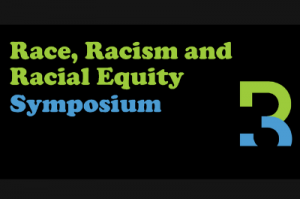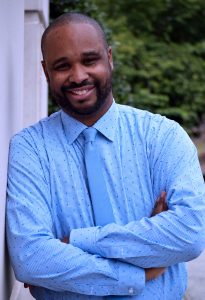R3 #7: Highlighting Participatory Justice Scholarship
The Race, Racism & Racial Equity (R3) Symposium is a series of virtual events that bring together scholars and researchers from across campus to share their work with Carolina and the broader community.
We will provide context on the state of race at UNC and in the U.S., complementing the work of the Chancellor’s Commission on History, Race and a Way Forward. R3 will also highlight the stellar and innovative work of our graduate researchers. R3 is co-hosted by the University Office for Diversity and Inclusion, the Jordan Institute for Families and the UNC School of Social Work‘s Office of Diversity, Equity and Inclusion.
This symposium was initially meant to be an annual, stand-alone event. However, the collective thirst for information, discussion and examination of race, racism and racial equity has been so powerful that it was expanded into a series.
In our 7th session we explore the multitudinous ways advancing participatory justice benefits everyone. This concept springs from cognitive linguistic work on the “separate fates” thinking that can accompany being confronted with the truth about systemic and endemic racism. For example, white folks, most of whom truly know nary a person of color readily and often subconsciously attribute health, economic, labor, and other disparities to “how those people live.” By countering this damaging thinking with acknowledging that (1) there are serious problems with systemic racism, (2) policy and practice levers exist to begin meaningfully addressing said racism, and (3) implementing said levers most often works to our collective benefit. The levers are mostly about securing and guaranteeing the centering of historically marginalized voices and perspectives in all decisions that affect the way people live, work, play.
R3 #7 RECORDING HEREMODERATOR:
TRAVIS ALBRITTON is a Clinical Associate Professor and Associate Dean for Diversity, Equity and Inclusion at UNC-CH’s School of Social Work. He is the Director of the Chapel Hill 3-Year MSW Program and the Faculty Liaison for the Dual Degree MSW/M.Div. program. Dr. Albritton is a two-time recipient of the School of Social Work Excellence in MSW Advising Award. He has also received the School of Social Work Excellence in Teaching Award and has been recognized numerous times with the dean’s recognition for excellence in teaching. Dr. Albritton is the chairperson for the School of Social Work diversity committee and he serves on the University’s Diversity, Equity and Inclusion Council. Dr. Albritton was selected by the Council on Social Work Education to receive a competitive scholarship to participate in the Management Development Program offered by the Harvard Graduate School of Education. The program is designed to prepare mid-level managers to address the complex issues faced by leaders in higher education. His research interests include educational equity in K-12, academic achievement among Black males and the importance of closing educational opportunity gaps for children of all ages. He has presented nationally on various topics including Critical Race Theory, the importance of critical conversations in the classroom and the educational needs of Black male high school students.
PANELISTS:
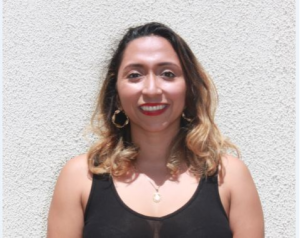
Ariana Ávila, MPH
PhD Student, Department of Anthropology
she/her
Ariana Ávila is a doctoral student at UNC-Chapel Hill’s Department of Anthropology. Studying medical/sociocultural anthropology, she is interested in food as a form of care among the farmworker community in Immokalee, Florida. Her research is guided by viewing food insecurity in Immokalee as food apartheid to better describe the violence of the political and racialized (food) structures that cause inaccessibility to food spaces. She earned her Bachelor of Science from the University of South Florida and her Master’s in Public Health from Tulane University School of Public Health and Tropical Medicine. Prior to beginning her PhD program, she served as a Global Health Fellow with the Centers for Disease Control and Prevention in Port-Au-Prince, Haiti (2016-2019). She is from a Mexican migrant farmworker family, born and raised in Arcadia, Florida. She loves cooking, gardening, plants, and most of the time, blending the three.
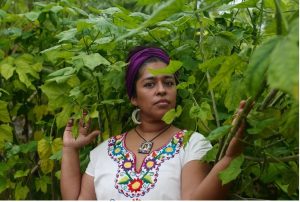
Lupita Vazquez Reyes
Community activist, platica healer, and Cultural worker
Community Research Partner
Lupita Vazquez Reyes is a native of Immokalee, Florida, where immigrant farm laborers provide two-thirds of the nation’s winter crops, yet suffer the irony of food insecurity in a food desert. She is a community activist, platica healer, and cultural worker. As the daughter of immigrant farmworkers who were organizers in the early days of immigrant farm labor movements in Southwest Florida, Lupita uses her background to inform and radicalize change in her community through her efforts to connect local knowledge of ancestral growing practices and storytelling. Her work centers a return to ancestral knowledge and stewardship of food ways, language, and comunidad in the garden, specifically among farmworker communities.
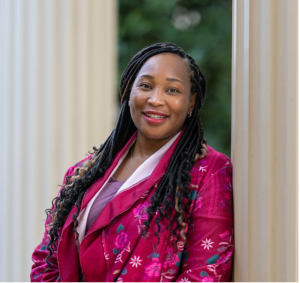
Iheoma U. Iruka, Ph.D.
Research Professor, Department of Public Policy
Fellow, Frank Porter Graham Child Development Institute (FPG)
Founding Director, Equity Research Action Coalition at FPG
Iheoma U. Iruka, Ph.D., (from the University of Miami) is a Research Professor in the Department of Public Policy and the Founding Director of the Equity Research Action Coalition at the Frank Porter Graham Child Development Institute at UNC Chapel Hill. Dr. Iruka is leading projects and initiatives focused on ensuring that minoritized children and children from low-income households are thriving through the intersection of anti-bias, anti-racist, culturally grounded research, program, and policy. She serves on numerous national and local boards and committees, including the National Academies of Sciences, Engineering, and Medicine, the American Psychological Association’s Board of Educational Affairs, and the Brady Education Foundation. In addition to being on the National Advisory Committee for the U.S. Census Bureau and a Census Advisor for the National Urban League, Dr. Iruka is the recipient of the 2022 American Psychological Association Mid-Career Award for Outstanding Contributions to Benefit Children, Youth, and Families.
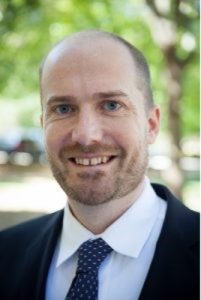 Andrew Whittemore
Andrew Whittemore
Associate Professor; Associate Chair, MCRP Program Director
Specialization: Land Use and Environmental Planning
Dr. Andrew H. Whittemore is an Associate Professor at DCRP teaching in the Land Use and Environmental Planning specialization. Dr. Whittemore’s research focuses on urban form, planning history, planning theory, land use planning, and zoning, primarily in the United States. He especially focuses on zoning’s influence on the built form of US cities and the politics associated with zoning decisions. He principally uses archival and ethnographic methods to explore questions about why local communities make the zoning decisions they do. He has published on the history of zoning and land use politics in Los Angeles, the FHA’s impact on local zoning, redevelopment politics in conservative contexts, the uses and politics of planned unit development, the role of racial bias in zoning decisions, the history of American urban form, and planning theory with a focus on phenomenological or humanist procedural approaches to planning.
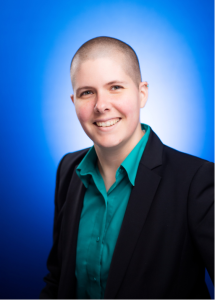
Catherine Fray
Former Town of Carrboro Planning Board Chair
Current Carrboro Town Councilmember
Catherine Fray has served on the Carrboro Planning Board since 2012, including two terms as chair. They do not have a formal planning background, but became interested in the planning process as a result of a proposed development in the Alabama Avenue neighborhood. Their priorities when reviewing proposed LUO changes or development applications are increasing affordable housing supply and responding to climate change.
VIEW PRESENTATION FROM BOLAND, HUFFSTETLER & WILLIAMS
VIEW PRESENTATION FROM BRACY, GREENE & BLACK
Previous R3 Symposia:
The symposium highlighted scholarship from UNC graduate students, research scientists, and faculty from the School of Government, the School of Education, and the School of Public Health. Their work examines racial equity interventions used to dismantle systems of oppression and can help us understand what actions can disrupt racism and create more just systems. Equitable practices call us to center the communities most impacted by our research. Two of the UNC scholars were joined by their community partners to share their experiences with community-university partnerships.
Environmental racism takes many forms, from higher rates of pollution and stormwater issues in BIPOC communities to racist planning policies that lead to gentrification and displacement, and white supremacist investments in automotive-centric transportation systems. This fourth R3 symposium highlighted scholarship addressing environmental justice and climate action from UNC graduate students, research scientists and faculty from Epidemiology, Public Health, Social Work and Urban Planning.
ARTivism: Using Arts-Based Scholarship to Interrogate and Dismantle Racism (Feb. 24, 2021)
The arts can help us better understand systems of oppression and their impacts, challenge white supremacy, foster dialogue around race and racism, and advance racial equity. This event highlighted work by UNC scholars and current and former graduate students to do just that through a variety of artistic genres, including performance, storytelling, music, painting, and photography. We were also honored to include a spoken word performance by Chapel Hill’s inaugural Poet Laureate, CJ Suitt.
In this second event in the series, scholars from across UNC, including Business and Communications, shared their work addressing issues of language, representation, cultural appropriation, and decontextualization of Black and Brown labor as it appears through a variety of media.
R3 co-convener Allison De Marco, Equity Lead, Jordan Institute for Families, School of Social Work and Advanced Research Scientist, Frank Porter Graham Child Development Institute, noted, “Our goal for the R3 symposium has always been to feature the important research happening across campus to make systems of oppression visible and this continues with the second in our series. In this panel, we will feature scholarship from both our faculty and our doctoral students, whose work brings to light the way that capitalist systems perpetuate cultural appropriation, decontextualization and uncompensated labor.”
R3 co-convener Allison De Marco, Equity Lead, Jordan Institute for Families, School of Social Work and Advanced Research Scientist, Frank Porter Graham Child Development Institute, noted, “Our goal for the R3 symposium was always to feature the important research going on across campus addressing race and racial equity and to foster cross-disciplinary collaboration. We plan to continue this idea through a series of virtual events that will both highlight this work and help us all to understand our role in dismantling systems of oppression.”
Related Stories:
- “Race, Research & Reckoning” (Sept. 14, 2020)
- “Cultural Industry, Techno-capitalism, and Labor: The Mediated Exploitation of Black and Brown Bodies” (Nov. 11, 2020)
- “R3 ARTivism Explores the Power of the Arts in Confronting White Supremacy (Mar. 2, 2020)
- “Race, Racism and Racial Equity Symposium hosts fourth seminar for UNC community” (Sept. 12, 2021)
- “R3 Examines Systems of Oppression in Justice, Education and Health” (Dec. 24, 2021)


